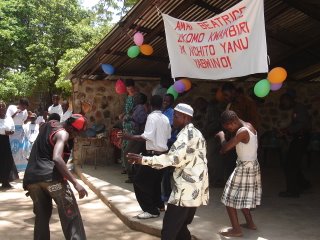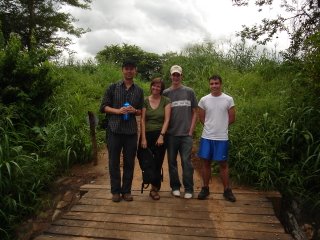Comings and goings

Beatrice's leaving party in full swing

On Joost's bridge with David and Gavin
20th January 2007
Chas’ nephew and his friend have arrived in Zambia this week, and we have travelled into Lusaka to meet them. We have shown them the sights of the capital city, but now today we are driving back to Mpanshya in the pouring rain. Dave and Gav are riding in the back of the van, sandwiched between half a dozen sacks of mealie meal, a couple of women complaining loudly to each other in Nyanja, and a baby, just to ensure that they have an real Zambian travel experience. It all gets slightly too authentic when we are driving back along the dirt road to the hospital and encounter a lorry stuck in the mud there. It is blocking most the road. One of the local minibuses has attempted to drive around it and is now stationary in a ditch, with no immediate prospect of moving forward. Some of the passengers are sitting around in the drizzle looking glum, others are trying to push the bus out of the hole. Eventually it rolls backwards, clearing a space for us to drive through. We get out and watch as Chas drives ahead, the vehicle lurching horribly as it ploughs through the ditch. For a moment I think we are going to get bogged down too, but Chas is of farming ancestry, and has clearly inherited some kind of tractor-handling gene. The Landcruiser emerges at the other side spattered with filth, and we run to catch it up, with the stranded minibus passengers in hot pursuit. The overloaded vehicle then proceeds slowly up the road, or rather, where we think the road might be, as it is now submerged under rapidly flowing water. Dave, sitting beside me in front says “This is the real Africa”.
21st January 2007
Beatrice is leaving Mpanshya tomorrow after three years of running the home based care service. It has been a long goodbye – there was a huge party to mark her departure last week, and there have been smaller celebrations for her in many of the surrounding villages – but now it is time for her to return to Switzerland. Father Leschek has invited us all over to the parish house for her last evening. We try to persuade Dave and Gav to come along too, but they decline. (I think their reluctance may be borne of having been persuaded to go to mass this morning, and then being hectored into standing up at the end and receiving a round of applause from the congregation. We may not be forgiven for that one anytime soon.)
But what a party it turns out to be. Sister Sabina force feeds us outsize pieces of gingerbread cake. Chris provides beer and music, although a few of the younger guests are nonplussed at his enthusiasm for the Calamity Jane soundtrack. (Chas tries to explain to one of the new volunteers that it comes from one of those old movies that you see on TV on Sunday afternoons as a kid. Brendan, who is twenty-three, says “Yeah, we had that in the States too, but the old movies were from the eighties”). And suddenly, apropos of nothing, Father gets out his double barrelled shotgun, and gives us a demonstration of how to dissemble and reassemble it. To the increasing alarm of the assembled company, he then decides to go out onto the balcony and fires the gun into the air, mujahadeen style, in Beatrice’s honour. And then, we round off the evening with a heated discussion on Satanism. It is an absolutely appropriate farewell for our friend, an eccentric but warm gathering of people who may have been in Africa for slightly too long.
